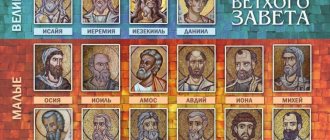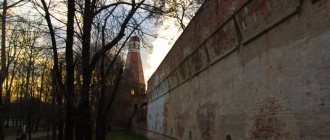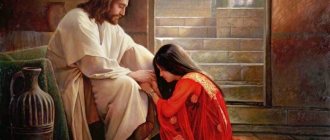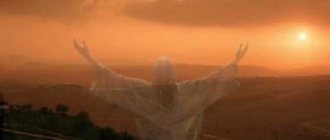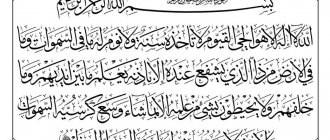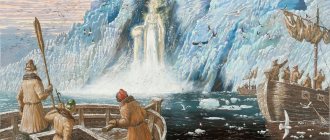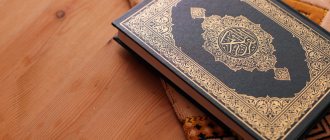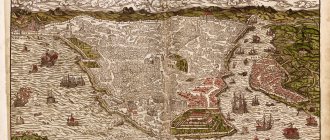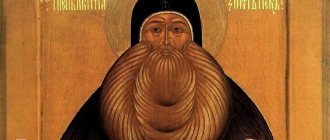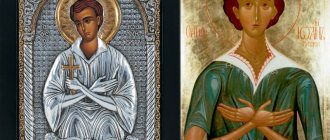| Holy Prophet Elijah. Icon of the mid-15th century, Novgorod. State Tretyakov Gallery. |
Elijah the Tishbite
(IX century BC), one of the greatest prophets and the first virgin of the Old Testament Memory July 20
Born in Thesbia of Gilead in the tribe of Levi in the 9th century. BC. The life of the holy prophet is described in the 3rd and 4th books of Kings.
Saint Epiphanius of Cyprus reports the following legend about the birth of the prophet Elijah: “When Elijah was born, his father Sovakh saw in a vision that handsome men greeted him, swaddled him with fire and fed him with a fiery flame.”
The name Elijah given to the baby, which means “the strength of the Lord” [1], determined his entire life. From an early age he devoted himself to the One God, settled in the desert and spent his life in strict fasting, contemplation of God and prayer.
Called to prophetic service under the Israeli king Ahab, the prophet became a fiery zealot for true faith and piety. At that time, the Israeli people fell away from the faith of their fathers, abandoned the One God and worshiped pagan idols, the veneration of which was introduced by the wicked king Jeroboam. The wife of King Ahab, the pagan Jezebel, especially supported idolatry, planting the worship of the idol Baal throughout the land. Seeing the death of his people, the prophet Elijah began to denounce King Ahab of wickedness, urging him to repent and turn to the True God, but the king did not listen to him. Then the prophet Elijah announced to him that, as punishment, there would be no rain or dew on the earth for three years and the drought would end only through his prayer.
And indeed, through the prayer of the prophet, the sky closed, and drought and famine occurred throughout the entire earth. The people suffered from unbearable heat and hunger. The Lord, in His mercy, seeing the suffering of the people, was ready to spare everyone and send rain to the earth, but did not want to violate the words of the prophet Elijah, who was burning with the desire to turn the hearts of the Israelis to repentance and return them to true worship of God. Preserving the prophet Elijah from the hands of Jezebel, the Lord, during a time of disaster, sent him to a hidden place in the desert near the stream Cherith. From the stream the prophet quenched his thirst, and the Lord commanded the predatory crows to bring food to the prophet, thereby instilling in him pity for the suffering people.
When, a year later, the stream of Horath dried up, the Lord sent the prophet Elijah to Zarephath of Sidon to a poor widow who suffered with her children in anticipation of starvation. At the request of the prophet, she prepared him unleavened bread from the last handful of flour and the rest of the oil. Then, through the prayer of the prophet Elijah, flour and oil from then on did not run out in the widow’s house throughout the famine. During his two years of staying in her house, by the power of his prayer, the great prophet performed another miracle - he resurrected the dead son of this widow.
| Elijah the prophet in the desert |
After three years of drought, the Merciful Lord sent a prophet to King Ahab to end the disaster.
Elijah ordered all Israel and the priests of Baal to gather on Mount Carmel. He announced to the king and the people that all the misfortunes of the Israelites were due to the fact that they had forgotten the true God and began to worship the idol Baal. To prove the error of the Israelites, Elijah proposed making two altars - one to Baal and the other to God. “The God who gives the answer through fire is God” (1 Kings 18:24), he said. The priests of Valla were the first to begin the sacrifice: they made an altar, piled up firewood, slaughtered the calf and cried out to the idol from morning to evening, but in vain - the sky was silent. In the evening, the holy prophet Elijah erected his altar of 12 stones, according to the number of tribes of Israel, laid the sacrifice on the firewood, ordered a ditch to be dug around the altar, and ordered to water the sacrifice and firewood with water. When the ditch was filled with water, the fiery prophet turned to God with a fervent prayer and petition, so that the Lord would send fire from heaven to admonish the erring and embittered Israeli people and turn their hearts to Himself. Through the prayer of the prophet, fire came down from heaven and burned the sacrifice, wood, and even stones and water. The people, having seen the miracle, believed in Him again and fell to the ground, crying out: “The Lord is God!” Then the prophet Elijah stabbed all the priests of Baal and began to pray for the sending of rain. Through his prayer, the sky opened and abundant rain fell, watering the thirsty earth. King Ahab realized his error and mourned his sins, but his wife Jezebel threatened to kill the prophet of God. The prophet Elijah fled to the kingdom of Judea and, grieving over his powerlessness to eradicate idolatry, asked God for his death. But an Angel of the Lord appeared to him, strengthened him with food and commanded him to go on a long journey. The prophet Elijah walked for forty days and nights and, having reached Mount Horeb, settled in a cave. Here, after a terrible storm, earthquake and flame, the Lord appeared to him “in the still wind” and revealed to the grieving prophet that He had preserved seven thousand faithful slaves who did not worship Baal. The Lord commanded the prophet Elijah to anoint Elisha, his heir, to the prophetic ministry.
After Mount Horeb, the ministry of Saint Elijah continued for several more years. Sent by God, he went to Damascus to anoint Hazael as king in Syria, and Jehu as king in Israel. By the will of God, Elijah found Elisha near the village of Abel-Mecholy and anointed him as a prophet.
For his fiery zeal for the glory of God, the prophet Elijah was taken “as if into heaven” alive in a chariot of fire. The prophet Elisha witnessed the ascension of the prophet Elijah and received, along with his fallen mantle, the gift of a prophetic spirit twice as great as the prophet Elijah had. Since, according to the word of the Lord, “no one ascended into heaven except the Son of Man who came down from heaven, who is in heaven” (John 3:13), Saint Elijah was thus transferred by the angels to another hidden place, where since then remains until the time of his second appearance [2].
God's man, priests and bulls
In the Russian translation of the Bible the prophet is called “Elijah”. The Hebrew equivalent of this name, Eliyahu (אֵלִיָּהוּ), means “My God is the Lord,” or more precisely, “My God is Yahweh” (Yahweh is “Lord” in Hebrew). Moreover, “Yahweh” meant not a simple name, but the proper name of God, which was not pronounced out loud.
According to the legend that has come down to us from Saint Epiphanius of Cyprus, at the birth of the prophet, his father saw how “certain handsome men swaddled him with fire and fed him with a fiery flame.” And the baby truly became a zealous, fiery servant of the one God.
The Prophet Elijah lived in the Northern Kingdom of Israel during the reign of the wicked king Ahab, who angered God by planting the cult of the pagan gods Baal and Ashtoreth to please his Phoenician wife.
For this, Elijah predicted a drought for all of Israel: “And Elijah (...) said to Ahab: As the Lord God of Israel lives, before whom I stand! These years there will be neither dew nor rain, except at my word" (1 Kings 17:1)
Disciple Elisha
The calling of Shaphat's son Elisha was simple and quick. The Bible tells how Elijah, knowing in spirit where to look for a disciple whom he had never seen before, finds the young man in the field where he was plowing with oxen, and “throws his mantle on him” (the wool cloak that covered the saint). The grace of God that was upon Elijah touched the heart of the future disciple. Without any doubt, he leaves his home, his family, and leaves with Elijah (1 Kings 19:20-21).
This is similar to the calling of the disciples by Christ Himself, as the Gospels tell us about, however, with one difference. St. Luke writes that the Lord forbids one young man who wanted to follow Him to say goodbye to his family, saying that “no one who puts his hand to the plow and looks back is fit for the Kingdom of God” (Luke 9:62).
But Elijah answers Elisha’s same request differently: “Go and come back, for what have I done to you?” (1 Kings 19:20). Here is the exact knowledge: Elisha will return, for so said the Lord. There is also a purely human understanding of how important his relatives are to Elisha. Even though Elijah left his home, probably his family, long ago, he is not a celestial being, but, in the words of the Apostle James, “a man is not servile to us” (James 5:17), knowing human weaknesses and, of course, not being harmed by them. free.
"Fiery" prophet
Elijah in the desert.
Washington Alston, 1818. Museum of Fine Arts, Boston, USA The drought lasted three and a half years. Finally, God told Elijah to have a “spiritual duel” with the servants of Baal. Elijah wanted to show not only King Ahab, but all of Israel who the true God is. The Prophet said to the priests of Baal: “Let them give us two bulls, and let them choose one bull for themselves, and cut it up, and put it on the firewood, but let them not put fire on it; and I will prepare another calf and put it on the wood, but I will not add fire; You call on the name of your god, and I will call on the name of the Lord my God. The God who gives the answer through fire is God” (2 Kings 18:23-24).
The servants of Baal prayed first. They shouted his name for hours, jumped around the altar, stabbed themselves with knives, but the Phoenician god did not respond. “At noon Elijah began to laugh at them and said: Shout with a loud voice, for he is a god; maybe he is lost in thought, or busy with something, or on the road, or maybe he is sleeping, so he will wake up” (1 Kings 18:27).
The priests of Baal achieved nothing, and Elijah came to the altar. He asked that the sacrificial calf, wood and stones of the altar be doused with water so that no one would doubt the power of the One God. And so, through the prayer of the prophet, a miracle happened: “The fire of the Lord fell and consumed the burnt offering, the wood, the stones, and the dust, and consumed the water that was in the trench. When all the people saw this, they fell on their faces and said, “The Lord is God, the Lord is God!” (1 Kings 18:38-39). The priests of Baal were executed, and heavy rain fell on the earth. The long-term drought has ended.
Fire in the Old Testament often accompanied manifestations of the True God - “And the sight of the glory of the Lord on the top of the mountain was before the eyes of the children of Israel like a consuming fire” (Ex. 24:17). Also in the Old Testament we often read that God “burns up” the enemies of the chosen people. According to the interpretation of Bishop Vissarion (Nechaev), fire is “a symbol of the punishing truth of God, the wrath of God,” but also “a sign of God’s mercy to the Israeli people.”
The Prophet Elijah became a living image of Divine judgment on people who do not want to know the True God.
Prayers
Troparion, tone 4
In the flesh, an Angel,/ the foundation of the prophets,/ the second Forerunner of the coming of Christ, the glorious Elijah,/ sending Elisse the grace from above/ to drive away illnesses/ and to cleanse lepers,// also to those who worship him Reads healing.
Kontakion, tone 2
Prophet and seer of the great deeds of our God,/ Elijah of great name,/ having established the water-flowing clouds with your prophecy,// pray for us to the One Lover of Mankind.
Greatness
We magnify you,/ holy, glorious prophet of God Elijah,/ and honor your glorious ascension to Heaven/ on a chariot of fire.
Foreign greatness
We magnify you, / prophet Elijah the glorious, / and we honor your fiery ascent into Heaven with flesh.
Foreign greatness
We magnify you, / prophet and forerunner of the coming of the Lord, glorious Elijah, / and we honor, even to Heaven with flesh, / your fiery ascent.
If Elijah didn't die, where is he now?
Elijah and the chariot of fire (fragment).
Giuseppe Angeli, 1740-55. National Gallery of Art, Washington, USA By the time of the reign of Joram (son of Ahab), Elijah had acquired enormous spiritual authority not only in the Northern but also in the Southern Kingdom. He no longer acted alone. He was helped by the faithful prophet Elisha and many disciples. According to the custom of those times, members of prophetic schools (“sons of the prophets”) lived in separate communities in cities, ate field vegetables (2 Kings 4:38-40), and preached the word of God (Judges 6:8-10).
Shortly before his ascension, Elijah, in the presence of Elisha, performed a great miracle: “And Elijah took his mantle (cloak - editor's note), and rolled it up, and struck the water with it, and it parted this way and that, and they both walked across on dry ground" (4 Kings 2:8).
But the culmination of the prophet’s life was another event: “Suddenly a chariot of fire and horses of fire appeared, and separated them both, and Elijah rushed into heaven in a whirlwind” (2 Kings 2:11).
Scripture emphasizes that he ascended in the body, not in the spirit. At the same time, it is often believed that the prophet Elijah was ascended on a chariot of fire to the Kingdom of Heaven, to the very Throne of God. However, the Church Slavonic translation of the Bible says that Elijah was taken up not into heaven, but “as into heaven”: “And Elijah was taken with the strands as if into heaven.”
This translation retains the particle “yako” (“as”), which was missed in the most common Synodal translation today. There is this particle (“ὡς” or “how”) in the Greek translation - the Septuagint. Based on these translations, Elijah “seems to” ascend into heaven.
The holy fathers do not have a common opinion about the whereabouts of Elijah after the ascension. Saint Bede the Venerable believed that the prophet would go to Paradise. According to Saint Bede, the rise of Elijah, of course, “is not a rapture into Heaven itself (like Christ), but an ascension into the air to a height from which he was already invisibly transported to the joys of paradise.”
Saint Demetrius of Rostov thinks the same. He believes that Elijah “was taken together with his flesh into heaven on a fiery chariot, and is still alive in the flesh, kept by God in the villages of paradise.”
However, Saint Gregory the Dvoeslov teaches that the prophet ascends to a hidden earthly place, where he must “dwell in bodily and mental peace until, at the end of the world, he again appears on earth to pay the debt of death.” The Venerable Roman the Sweet Singer argues in the same vein. The kontakion he composed for the Ascension of the Lord says: “Elijah, seated on a fiery chariot, ascended, but did not reach heaven, as it is written: as far as heaven. The God of Enoch and the God of Elijah ascended to heaven, declaring to us: “I am not separated from you, I am with you, and no one is against you.”
Elijah's whereabouts after his ascension remain a mystery. One thing is obvious: the ascension of Elijah is a prototype of the Ascension of Jesus Christ and the life of the righteous in the Kingdom of Heaven. Saint Ambrose of Milan writes: “Elijah was caught up in a fiery chariot, and the Church will also be lifted up. You do not trust me? Believe Paul, in whom Christ said: “We will be caught up in the clouds to meet the Lord in the air, and so we will always be with the Lord.”
Ascension to Heaven
Elijah had a disciple whose name was Elisha. It was revealed to him that Elijah would soon leave him in an unusual way. Therefore, he began to pursue him everywhere to see this miracle. One day they were walking together, but Elijah told Elisha to stay and not go further with him. He refused.
The Prophet asked what he wanted most. Elisha answered: the same grace as Elijah. The Prophet said that he would receive it if he caught his outer garment (it was called "cute").
They walked on, and suddenly a chariot of fire came down from the sky and took Elijah away. He managed to throw down Elisha's mantle from above. He caught it, and grace descended on him. He also began to work miracles.
Why does Elijah appear in the New Testament?
Holy Prophet Elijah in the desert.
Fresco from Gracanica Monastery, Kosovo, Serbia. Around 1320. Image: https://diomedes2.livejournal.com/ At the turn of the Old and New Testaments, people expected the imminent return of Elijah to earth, according to the prediction of Malachi, the last Old Testament prophet (“I will send you Elijah the prophet before the coming of the great and terrible day of the Lord” (Mal. 4:5)).
The Israelis saw the fervor of Elijah first in the ministry of John the Baptist, then in the preaching of Jesus Christ. Some thought that one of these two was Elijah (John 1:21; Matt. 16:14).
However, the real Elijah appeared to the Lord Jesus Christ on Mount Tabor. The apostles Peter, James and John witnessed this. They saw Elijah and Moses talking with Christ in His uncreated light: “And His face shone like the sun, and His clothes became white as light. And behold, Moses and Elijah appeared to them, talking with Him” (Matt. 17:1-3).
The Prophet Elijah appeared on Mount Tabor for a number of reasons. Firstly, in order to act as the personification of the prophetic writings, just as Moses acts as the personification of the Law (Blessed Jerome of Stridon). Secondly, to dispel the misconceptions of people who believed that Elijah is Christ, and to show that Christ is God (for he emits Light), and the prophets are His slaves (this interpretation was proposed by Saint Ephraim the Syrian). Thirdly, so that people know that Jesus is the lord of life and death, since Moses died and Elijah lives (interpretation of Euthymius Zigabena). Finally, to show that the “day of the Lord” predicted by Malachi has already arrived.
Will expose the Antichrist and turn water into blood
According to Church Tradition, the mission of the prophet Elijah is not yet completed. He, together with the Old Testament righteous man Enoch, who was also taken alive “as if into heaven,” awaits the onset of the last times and the reign of the “man of sin” - the Antichrist, who will pretend to be God.
When this happens, Elijah and Enoch will expose the iniquities of the Antichrist. John the Theologian in his “Revelation” writes: “they will prophesy for one thousand two hundred and sixty days, clothed in sackcloth” (Rev. 11:3).
The Venerable Ecumenius of Trikka explains: “After Elijah the Tishbite, Enoch will come, anticipating the second coming of Christ, which should happen after the coming of the Antichrist. For they say that they will come first and will be witnesses that the signs performed by the Antichrist are false and that there is no need to believe the sinner.” Revelation also says that the prophets will denounce the Antichrist “with authority and power”: they will be able to close the heavens so that it does not rain, turn water into blood and smite the earth with plagues (Rev. 11:6). It is predicted that by God’s permission they will be killed, but after three and a half days they will be resurrected, marking the beginning of the Second Coming of Christ.
Latest prophecies
The earthly ministry of the saint of God was coming to an end. The last years of his life were a time of prayerful solitude. But, foreseeing in spirit the wickedness of Ahab and his family, the prophet several times convicted them of their iniquities:
- they predicted the death of Ahab after he and Jezebel unrighteously took away Naboth’s vineyard, falsely accusing him of being a blasphemer, a traitor; only the repentance of the weak-willed, but still believing sovereign slightly softened the wrath of God;
- Elijah accused Ahab's heir, Ahaziah, of apostasy; having inherited not only the kingdom, but also the spiritual infirmities of his father, this king, having become seriously ill, tried to turn to the long-rejected Baal, for which he was punished by death.
So what does the Airborne Forces have to do with it?
The prophet was “appointed” as the patron of the Airborne Forces, partly due to a calendar coincidence - the first landing of troops in the USSR (the “birthday” of the Airborne Forces) took place on August 2, 1930, on the day of remembrance of the Prophet Elijah, partly due to the fact that the image of the prophet is zealous, faithful to his work - can really inspire warriors.
It is interesting that in the 10th century, long before the baptism of Rus', some of Prince Igor’s warriors (in a sense, the first “special forces”), upon receiving baptism, spoke of special veneration of the prophet Elijah. And in the agreement between Prince Igor and the Byzantines for 944, you can find lines that the princely warriors “swore by the Church of the Prophet Elijah” - the first Orthodox church of Kievan Rus, built, according to legend, by princes Askold and Dir.
